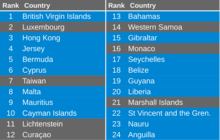Bermuda Black Hole
_(Americas_centered).svg.png)

Bermuda black hole is the term given to the final destination of corporate tax avoidance schemes which end up in an offshore tax haven/offshore financial centre.
The term "black hole" is mostly used in relation to a corporation because once the money enters Bermuda, it does not emerge again (or it could be subject to corporation tax). Instead, the money is "lent out" to the corporate parent (or its subsidiaries) to avoid repatriation (and taxing). This has led to US corporations amassing over $1trn in locations like Bermuda by 2017.[1] It is less applicable to individuals as they can move residence more easily, and release the funds from the "black hole".
The Bermuda black hole is used by US corporations exploiting gaps in the US tax code to shield foreign income in perpetuity from US repatriation (and taxation).
It is the final step of the double Irish with a dutch sandwich tax strategy used by US technology firms in Ireland (incl. Google, Apple and Facebook)[2][3][4][5][6][7][8]
The change in the US tax code from the Tax Cuts and Jobs Act of 2017 ("TCJA") should diminish the ability of US corporations to use a Bermuda black hole as all worldwide income for US corporations is now deemed automatically repatriated under the TCJA.
Note, the term is not unique to Bermuda, and can be used to describe any type of offshore tax haven (i.e. Cayman black hole).[9][10]
The Bermuda black hole was classified as the 5th largest of 24 sink ofc in the 2017 analysis of offshore financial centres "Uncovering Offshore Financial Centers: Conduits and Sinks in the Global Corporate Ownership Network" published in Nature Magazine.[11]
The 5 global conduit ofcs (Netherlands, United Kingdom, Ireland, Singapore and Switzerland) are countries not formally labelled tax havens by the EU/OECD, but who have "advanced" legal and tax structuring vehicles that can route funds to the 24 sink ofcs (block hole tax havens), without incurring tax in the conduit ofc.
It is possible the term "sink ofc" will come to replace the term "black hole", in describing corporate tax strategies that use tax havens/offshore financial centres
See also
References
- ↑ "The real story behind US companies' offshore cash reserves". McKinsey & Company. June 2017.
- ↑ "Apple's cash mountain, how it avoids tax, and the Irish link". Irish Times. 6 November 2017.
- ↑ "After a Tax Crackdown, Apple Found a New Shelter for Its Profits". New York Times. 6 November 2017.
- ↑ "'Double Irish' and 'Dutch Sandwich' saved Google $3.7bn in tax in 2016". Irish Times. 2 January 2018.
- ↑ "Google's 'Dutch Sandwich' Shielded 16 Billion Euros From Tax". Bloomberg. 2 January 2018.
- ↑ "'Double Irish' limits Facebook's tax bill to €1.9m in Ireland". Financial Times. 5 December 2013.
- ↑ "Facebook paid just €30m tax in Ireland despite earning €12bn". Irish Indepdenent. 29 November 2017.
- ↑ Drucker J. (2010). The Tax Haven That's Saving Google Billions. Business Week.
- ↑ "RECOVERING ILLICIT ASSETS OFFSHORE: DEMYSTIFYING THE BLACK HOLE". KRyS Global. June 2016.
- ↑ "The Governance of the Black Holes of the World Economy: Shadow Banking and Offshore Finance". City University (London). June 2013.
- ↑ "Uncovering Offshore Financial Centers: Conduits and Sinks in the Global Corporate Ownership Network". Nature Magazine. 24 July 2017.